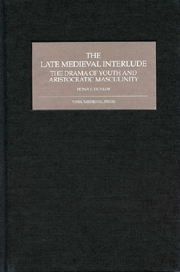Book contents
- Frontmatter
- Contents
- Dedication
- Acknowledgements
- List of Abbreviations
- Introduction: The interlude as a literary genre
- 1 Defining Youth
- 2 Young Masculinity and Late Medieval Discourses of Youth
- 3 Noble Masculinity in the Interludes
- 4 Interludes and the Politics of Youth
- Conclusion
- Bibliography
- Index
- YORK MEDIEVAL PRESS: PUBLICATIONS
3 - Noble Masculinity in the Interludes
Published online by Cambridge University Press: 05 February 2013
- Frontmatter
- Contents
- Dedication
- Acknowledgements
- List of Abbreviations
- Introduction: The interlude as a literary genre
- 1 Defining Youth
- 2 Young Masculinity and Late Medieval Discourses of Youth
- 3 Noble Masculinity in the Interludes
- 4 Interludes and the Politics of Youth
- Conclusion
- Bibliography
- Index
- YORK MEDIEVAL PRESS: PUBLICATIONS
Summary
The young noblemen of the interludes Nature, Fulgens and Lucres, The Worlde and the Chylde, The Interlude of Youth and Calisto and Melebea are mature in physical terms – not only sexually mature, but they have clearly reached the end of their ‘ful incresing’, in the words of John Trevisa, and have attained the height of their physical powers. Some of these plays also mark characters’ transitions to an adult aristocratic masculinity with decisive change in their circumstances, as they engage servants and enlarge households. These young men are socially mature, since they no longer have to live under the authority of others, unlike the young noblewomen of the plays who remain under the governance of their fathers. Instead, young men exercise an authority of their own, usually as the masters of servants. Yet they remain socially immature to an extent, in the sense that few have experienced all of what Mark Ormrod has called the ‘life-events’ and ‘career firsts’ typical of later medieval English aristocrats. None are yet married. Only Gaius in Fulgens and Lucres has taken part in military campaigns and is actively involved in the exercise of political authority (I.97, II.681). The young noblemen are located in a liminal period between childhood and fully realized noble adulthood. They are in the process of negotiating for themselves an adult masculinity which will determine the tenor of their adult lives.
- Type
- Chapter
- Information
- The Late Medieval InterludeThe Drama of Youth and Aristocratic Masculinity, pp. 54 - 89Publisher: Boydell & BrewerPrint publication year: 2007



